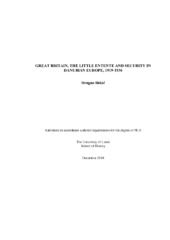Приказ основних података о документу
Great Britain, the Little Entente and security in Danubian Europe, 1919-1936
| dc.creator | Bakić, Dragan | |
| dc.date.accessioned | 2018-06-06T14:46:18Z | |
| dc.date.available | 2018-06-06T14:46:18Z | |
| dc.date.issued | 2010 | |
| dc.identifier.uri | http://etheses.whiterose.ac.uk/1435/ | |
| dc.identifier.uri | https://dais.sanu.ac.rs/123456789/3319 | |
| dc.description.abstract | This thesis examines British foreign policy towards Danubian Europe from the end of World War One to the Rhineland crisis of 1936 with special reference to security issues. The Foreign Office’s attitude towards the alliance known as the Little Entente, which was comprised of Czechoslovakia, Yugoslavia and Romania, is the primary focus of the study, and, by implication, the British outlook on the countries with which the Little Entente was mainly concerned, namely Hungary and, to a lesser extent, Austria and Bulgaria, also features heavily.Danubian Europe presented constant and serious security risks for European peace and stability and, for that reason, contrary to conventional wisdom, it commanded the attention of British diplomacy with a view to appeasing local conflicts. This study looks at the manner in which the Foreign Office perceived and treated the antagonism between the Little Entente and Hungary, on the one hand, and the impact that the former had in connexion with Franco-Italian rivalry in Central/South-Eastern Europe, on the other. With Hitler’s accession to power the Little Entente was viewed in Whitehall in relation to its place in the prospective policy for preserving Austrian independence and containing German aggression in the region. It is suggested here that the British approach to security problems in Danubian Europe had certain permanent features which stemmed from the general British outlook on the new successor states – the members of the Little Entente - founded on the ruins of the Habsburg monarchy. It was the lack of confidence in their stability and permanence, as well as the misperceptions about the motives and intentions of the policies pursued by other Powers towards Central/South-Eastern Europe, which accounted for the apparent sluggishness and ineffectiveness of the Foreign Office’s dealings with security challenges. | en |
| dc.publisher | Leeds : University of Leeds | |
| dc.rights | openAccess | |
| dc.rights.uri | https://creativecommons.org/licenses/by-nc-sa/4.0/ | |
| dc.title | Great Britain, the Little Entente and security in Danubian Europe, 1919-1936 | en |
| dc.type | doctoralThesis | |
| dc.rights.license | BY-NC-SA | |
| dcterms.abstract | Бакиц, Драган; | |
| dc.type.version | publishedVersion | |
| dc.identifier.fulltext | https://dais.sanu.ac.rs/bitstream/id/10554/Bakic2010-Great_Britain_the_Little_Entente_and_security.pdf | |
| dc.identifier.rcub | https://hdl.handle.net/21.15107/rcub_dais_3319 |

